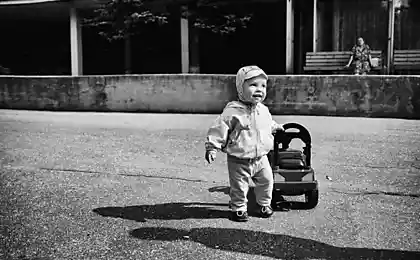139
How Birth Order Shapes Your Adult Life
Scientific discoveries about the impact of family position on character, career and relationships

Imagine two successful CEOs of large companies. One of them always takes responsibility, is prone to perfectionism and naturally becomes a leader in any situation. Another is creative, able to find non-standard solutions and easily adapt to changes. What distinguishes them? Perhaps it’s all about whether they were the oldest or youngest children in the family.
Research in developmental psychology shows that birth order has a much deeper impact on personality formation than is commonly believed. Austrian psychologist Alfred Adler in the early XX century suggested that the position of the child in the family determines his life strategy. Modern scientific evidence supports this theory, revealing surprising patterns.
Older Child: A Natural Born Leader
Characteristics of older children
Older children receive the undivided attention of parents in the first years of life, which forms their special attitude to the world. They get used to high expectations and often become “little adults” as children. A study by Frank Salloway found that 21 of the first 23 U.S. astronauts were firstborn or only children.
Older children are more likely to choose professions related to leadership and responsibility. They become managers, doctors, lawyers, engineers. Among American presidents, more than half were the eldest children in the family, including George Washington, Thomas Jefferson and Barack Obama.
Strengths of older children: high responsibility, organizational abilities, desire for achievements, reliability, propensity for planning.
Potential difficulties: Perfectionism, difficulty with delegation, increased anxiety when failures, tendency to control.

The Middle Child: The Master of Compromises
Unique position of mediator
Middle children find themselves in a special situation: they do not receive the privileges of the firstborn and do not enjoy the indulgence that is usually shown to the younger. This forces them to develop diplomatic skills and seek their unique niche in the family.
Psychologist Katherine Salmon found that middle children are more likely than others to become revolutionaries and fighters for justice. Martin Luther King, Nelson Mandela, John F. Kennedy were all middle children. Their ability to see injustice and desire to change the existing order of things is formed precisely from their position in the family hierarchy.
Youngest Child: Creative Rebel
Creativity as a survival strategy
Children grow up in an atmosphere of relative freedom. By the time they arrived, parents had already gained experience and had become less anxious. This allows younger children to experiment and be more creative.
Among comedians, 79 percent were the youngest children in the family. Jim Carrey, Eddie Murphy, Billy Crystal are all young children. In the world of sports, younger children are more likely to choose extreme sports that require risk-taking and out-of-the-box thinking.
The Only Child: Perfection as the Norm
Features of development without competition
Only children receive all the attention of parents throughout childhood. This creates unique conditions for development: on the one hand, more resources and opportunities, on the other hand, increased expectations and lack of experience in competing with brothers and sisters.
Only children often demonstrate the characteristics of older children in an enhanced form: high academic achievements, a desire for perfection, a tendency to independence. They feel comfortable in the company of adults and are often ahead of their peers in intellectual development.

Practical recommendations for different types
For older children: Learn to delegate and accept imperfection. Develop relaxation skills and don’t be afraid to ask for help. Remember that not everything needs to be under your control.
For middle-aged children: Appreciate your unique ability to mediate and compromise. Develop self-confidence and don’t forget your own needs while striving to please everyone.
For younger children: Use your creativity in the professional sphere. Develop responsibility and discipline, which can be your weaknesses.
For single children: Develop teamwork skills and the ability to compromise. Learn to accept criticism constructively and not see failure as a disaster.
It's important to remember: Birth order is just one of the factors that influence personality formation. Genetics, cultural environment, education, personal experience play an equally important role. Understanding the influence of position in the family helps to better understand yourself and others, but does not determine fate.
Modern research also shows that in families with a large age gap between children (more than 5 years), the effect of the order of birth can manifest itself in different ways. The youngest child in such a family may exhibit the features of an only child or even an older one if he is raised almost separately from older siblings.
Interesting data is provided by the study of twins. Even the difference of a few minutes between birth can affect personality development. The first twin born often exhibits the features of the older child, while the second one shows the features of the younger.
Understanding how your birth order influenced your personality formation opens up new opportunities for self-development. This knowledge helps explain some behaviors, career preferences, and relationship building styles. The main thing is to use this information not as an excuse for restrictions, but as a tool to maximize your potential.
Glossary
Birth order
The position of the child in the family according to the time of birth, which affects the formation of personal characteristics and behavioral patterns.
Family dynamics
The system of relationships between family members, including the distribution of roles, rules of communication and emotional connections.
Perfectionism
The desire for perfection in all areas of life, often accompanied by the fear of making a mistake and excessive demands on yourself.
Adaptability
Ability to adapt to changing conditions and to function effectively in new situations.
Mediation.
A process of conflict resolution through a neutral mediator aimed at finding a mutually acceptable solution.
5 Rules to Rebuild a Ruined Life | Miyamoto Musashi Strategy
What will happen if you connect with your Soul: Pros and cons (with a bit of humor)























